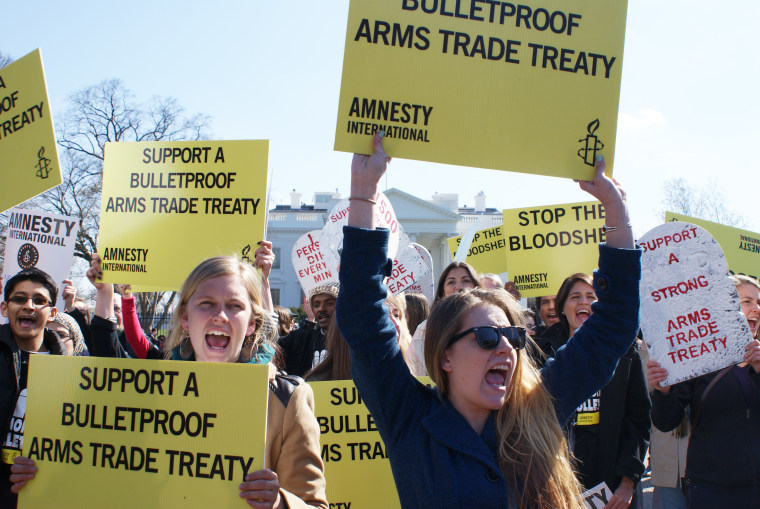Senators passed an amendment to block the Obama administration from signing any future U.N. Arms Trade Treaty in a 53-to-46 vote early Saturday morning before dawn. The measure, introduced by Sen. James Inhofe, R-Okla., was one of dozens passed as part of an all-night “vote-a-rama” that led to the first national economic budget passed by the Senate in four years.
The gun lobby-backed Inhofe amendment requires the executive branch “to uphold Second Amendment rights and prevent the United States from entering into the United Nations Arms Trade Treaty."
Negotiations on the treaty are scheduled through March 28 in New York as U.N. members debate regulations on the international flow of arms. Nations have negotiated the details of a proposed international arms treaty without achieving one for over a decade. In 2009 the Obama administration reversed a decision by the Bush administration, leading the United States to join 152 other nations in backing the effort. Earlier this month, Secretary of State John Kerry pledged U.S. support for achieving a “strong and effective” treaty.
But the gun lobby-backed measure stops U.S. support for the treaty, at least for now. Human rights groups like Amnesty International have long backed the establishment of an international treaty as a way of curbing arms to flows to abusive states and other actors. But many nations with their own human rights problems have been working to quietly weaken the proposed treaty on their own.
“The deadline is rapidly approaching for diplomats to agree [on] decent rules to prevent the unlawful killing, grave abuses and devastation caused by the reckless international arms trade,” said Brian Wood, head of Arms Control and Human Rights at Amnesty International, this week in London.
The National Rifle Association is using the same debate, as it now claims to be protecting Americans’ gun rights from being restricted by the United Nations. (Today, in many American gun circles, the United Nations may be the only entity loathed more than the Obama administration.)
“[L]eaders from countries around the world–many of which have deplorable human rights records-- are working to draw up an international treaty designed to severely restrict or even outright ban the right to sell, purchase, carry or own a firearm in America,” read a statement over the weekend by the NRA’s lobbying wing.
But few other organizations seem to view the U.N. arms treaty the same way. The American Bar Association addressed the NRA’s claims in a study last month, concluding that even if the United States were to sign such a treaty, the United States would still retain “the discretion to regulate the flow of weapons in and out of the United States in a manner consistent with the Second Amendment.”
The bar association study explains several reasons why. First, most of the weapons covered by the U.N. Arms Trade Treaty would be large conventional weapons like attack helicopters, tanks or large-caliber artillery. Only one category to be covered by the proposed U.N. treaty, small arms and light weapons, would have any conceivable overlap with the American Second Amendment.
In addition, the proposed treaty, unlike what the NRA has been claiming to its members, is unlikely to curb ongoing American arms exports. The State Department already regulates U.S. arms exports, while arguments and court decisions over the Second Amendment have all focused exclusively on arms within the United States. Nor would an international arms treaty apply to America’s importations of firearms.
For human rights advocates, the treaty is about improving human rights around the world by curbing the flow of arms to those who are systematically abusing people.
“The whole purpose of a global Arms Trade Treaty is to end the body bag approach–to nip armed violence in the bud and to prevent serious violations of human rights by cutting off the irresponsible arms supplies that fuel them,” Wood said.
No matter its outcome, the debate has already served the gun lobby well, affording the NRA the opportunity to grandstand before its domestic base no longer just at home, but seemingly before the world.
“The NRA is the largest and most active firearms rights organization in the world, with four million members who represent 100 million law-abiding Americans who own firearms,” said NRA CEO Wayne LaPierre at a United Nations conference in New York this past July. “On behalf of those 100 million American gun owners, I am here to announce NRA’s strong opposition to anti-freedom policies that disregard American citizens’ right to self-defense.”
